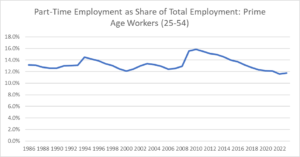February 19, 2024
When it comes to economic issues, you can reliably count on the NYT opinion pages (except Paul Krugman) to be behind the times. In keeping with its reputation, the NYT had a column by Adelle Waldman about workers not being able to control their hours of work, and often getting fewer hours than they need to support themselves and their families.
To be clear, this is a very real problem. It matters if workers can’t count on a regular schedule and it certainly is a big deal if a worker who needs to put in 40 hours a week can only get 30 hours, or even less.
The problem with Waldman’s piece is that this issue of not controlling hours is almost certainly less of a problem in the current strong labor market than it has been in the past. The graph below shows the percentage of prime-age (25 to 54) workers who work part-time (less than 35 hours a week) as a share of total employment.

Source: Bureau of Labor Statistics and author’s calculations.
There are a few things to note about this graph. First, I’m showing the shares for prime-age workers because many younger and older workers choose to work part-time. The second point is that the share moves counter-cyclically, it rises when the economy falls into recession, as it did in the early 1990 and the Great Recession and falls when the labor market is strong. This brings up the third point, that the part-time share is now near a record low.
In other words, the news about part-time employment is that the story today is relatively good, exactly the opposite of the thrust of this piece. This is likely one reason why workplace satisfaction is at a record high.
This is not to say that control over work hours is not an important issue. Millions of workers still can’t work as many hours as they need to support their families. Also, workers are often forced to work overtime, at risk of losing their jobs, or irregular hours that conflict with family obligations.
However, what is most bizarre about the piece is the ignorance it displays about battles over these issues:
“One of the most surprising aspects of this movement toward part-time work is how few white-collar people — including economists and policy analysts — have seemed to notice or appreciate it. So entrenched is the assumption that full-time work is on offer for most people who want it that even some Bureau of Labor Statistics data calculate annual earnings in various sectors by taking the hourly wage reported by participating employers and multiplying it by 2,080, the number of hours you’d work if you worked 40 hours a week, 52 weeks a year. Never mind that in the real world few workers in certain sectors are given the option of working full-time.”
The reason economists tend to focus on hourly wages is that many people opt to work part-time employment. (Roughly 80 percent of part-time employment is voluntary.) There is nothing wrong with people opting to work less than a full-time job if they want to have time to deal with family responsibilities, go to school, or simply pursue other activities. We usually want to distinguish between people seeing a fall in annual pay because they are paid less, as opposed to working fewer hours.
As far as economists ignoring involuntary part-time, as someone who has been writing about monthly employment reports for more than three decades, I always look at the number of people who report working part-time involuntarily. The same is true for most of the other people writing on these reports. It is hard to imagine a claim further from the truth.
And the issue of not controlling hours has been well-tread ground for decades. The same is the case with irregular and bad hours. This has long been a topic for labor activism, most notably efforts to impose restrictions of “clopening,” requiring workers to come in early to open a restaurant after they stayed late to close it the night before.
In short, control over work hours is in fact a very important issue. Unfortunately, Adelle Waldman’s piece has little to contribute to the debate.







Comments